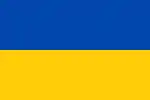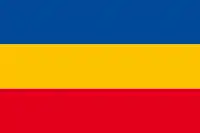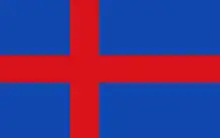Arthur Adolf, Count of Posadowsky-Wehner, Baron of Postelwitz (German: Arthur Graf[lower-alpha 1] von Posadowsky-Wehner Freiherr[lower-alpha 2] von Postelwitz, 3 June 1845 – 23 October 1932) was a German conservative statesman. He served as the secretary for the Treasury (1893–1897), secretary of the Interior, vice-chancellor of the German Empire and Prussian minister of State (1897–1907).
Biography
Born to Silesian nobility, the son of a judge, Posadowsky-Wehner studied law in Berlin, Heidelberg and Breslau and earned a doctorate in law in 1867. He subsequently acquired an agricultural property, and entered politics in 1871, when he became a member of the province government in Posen. In 1882 he became a member of the Parliament of Prussia, and was appointed Landeshauptmann of Posen in 1885.
Posadowsky was a crucial figure for the election reform in 1903. He took care of a new voting technique to protect the secrecy of the ballot for the German parliament.
Posadowsky-Wehner was the candidate of the German National People's Party for the Presidency of Germany in 1919, but he lost to Friedrich Ebert.
Honours
He received the following orders and decorations:[1]
.svg.png.webp) Kingdom of Prussia:
Kingdom of Prussia:
- Knight of the Black Eagle, with Collar
- Knight of the Wilhelm-Orden, with Collar, 27 January 1900 – on the occasion of the Emperor's birthday[2]
- Grand Cross of the Red Eagle, with Oak Leaves, 27 January 1902 – on the occasion of the Emperor´s birthday;[3] with chain December 1902[4]
- Knight of the Crown Order, 1st Class
- Knight of Justice of the Johanniter Order
 Duchy of Anhalt: Grand Cross of the Order of Albert the Bear
Duchy of Anhalt: Grand Cross of the Order of Albert the Bear
.svg.png.webp) Austria-Hungary:[5]
Austria-Hungary:[5]
- Grand Cross of the Imperial Order of Leopold, 1900
- Grand Cross of the Royal Hungarian Order of St. Stephen, 1906
.svg.png.webp) Baden: Grand Cross of the Zähringer Lion, 1895[6]
Baden: Grand Cross of the Zähringer Lion, 1895[6].svg.png.webp) Kingdom of Bavaria:
Kingdom of Bavaria:
.svg.png.webp) Belgium: Grand Cordon of the Order of Leopold (civil)
Belgium: Grand Cordon of the Order of Leopold (civil) Brunswick: Grand Cross of the Order of Henry the Lion
Brunswick: Grand Cross of the Order of Henry the Lion.svg.png.webp)
.svg.png.webp)
.svg.png.webp) Ernestine duchies: Grand Cross of the Saxe-Ernestine House Order
Ernestine duchies: Grand Cross of the Saxe-Ernestine House Order Grand Duchy of Hesse: Grand Cross of the Merit Order of Philip the Magnanimous, 16 November 1898[8]
Grand Duchy of Hesse: Grand Cross of the Merit Order of Philip the Magnanimous, 16 November 1898[8]_crowned.svg.png.webp) Kingdom of Italy: Grand Cross of Saints Maurice and Lazarus
Kingdom of Italy: Grand Cross of Saints Maurice and Lazarus Mecklenburg: Grand Cross of the Wendish Crown, with Golden Crown, 27 February 1905[9]
Mecklenburg: Grand Cross of the Wendish Crown, with Golden Crown, 27 February 1905[9] Oldenburg: Grand Cross of the Order of Duke Peter Friedrich Ludwig, with Golden Crown
Oldenburg: Grand Cross of the Order of Duke Peter Friedrich Ludwig, with Golden Crown Russian Empire: Knight of St. Alexander Nevsky
Russian Empire: Knight of St. Alexander Nevsky.svg.png.webp) Saxe-Weimar-Eisenach: Grand Cross of the White Falcon
Saxe-Weimar-Eisenach: Grand Cross of the White Falcon.svg.png.webp) Kingdom of Saxony: Grand Cross of the Albert Order, with Golden Star, 1894[10]
Kingdom of Saxony: Grand Cross of the Albert Order, with Golden Star, 1894[10] Württemberg:[11]
Württemberg:[11]
- Grand Cross of the Friedrich Order, 1895
- Grand Cross of the Württemberg Crown, 1905
Publications
- Über die Altersversorgung der Arbeiter (1883)
- Geschichte des schlesischen adligen Geschlechtes der Grafen Posadowsky-Wehner, Freiherren von Postelwitz (1891)
- Luxus und Sparsamkeit (1909)
- Die Wohnungsfrage als Kulturproblem (1910)
- Volk und Regierung im neuen Reich (1932)
Notes
- ↑ Regarding personal names: Until 1919, Graf was a title, translated as Count, not a first or middle name. The female form is Gräfin. In Germany, it has formed part of family names since 1919.
- ↑ Regarding personal names: Freiherr is a former title (translated as Baron). In Germany since 1919, it forms part of family names. The feminine forms are Freifrau and Freiin.
References
- ↑ Handbuch über den Königlich Preußischen Hof und Staat fur das jahr 1908, p. 58
- ↑ "Germany". The Times. No. 36051. London. 29 January 1900. p. 6.
- ↑ "The German Emperor´s birthday". The Times. No. 36676. London. 28 January 1902. p. 3.
- ↑ "Latest intelligence - the German Tariff Bill". The Times. No. 36951. London. 15 December 1902. p. 5.
- ↑ "Ritter-Orden", Hof- und Staatshandbuch der Österreichisch-Ungarischen Monarchie, 1918, pp. 55, 74, retrieved 14 December 2021
- ↑ "Großherzogliche Orden", Hof- und Staats-Handbuch des Großherzogtum Baden (in German), Karlsruhe, 1892, pp. 146
{{citation}}: CS1 maint: location missing publisher (link) - ↑ "Königliche Orden", Hof- und Staats-Handbuch des Königreich Bayern (in German), Munich, 1908, p. 10
{{citation}}: CS1 maint: location missing publisher (link) - ↑ "Verdienst-Orden Philipps des Großmütigen", Großherzoglich Hessische Ordensliste (in German), Darmstadt: Staatsverlag, 1907, p. 128 – via hathitrust.org
- ↑ "Großherzogliche Orden und Ehrenzeichen". Hof- und Staatshandbuch des Großherzogtums Mecklenburg-Strelitz: 1907 (in German). Neustrelitz: Druck und Debit der Buchdruckerei von G. F. Spalding und Sohn. 1907. p. 15.
- ↑ Sachsen (1901). "Königlich Orden". Staatshandbuch für den Königreich Sachsen: 1901. Dresden: Heinrich. p. 145 – via hathitrust.org.
- ↑ "Königliche Orden", Hof- und Staats-Handbuch des Königreich Württemberg, Stuttgart: Landesamt, 1907, pp. 50, 122
